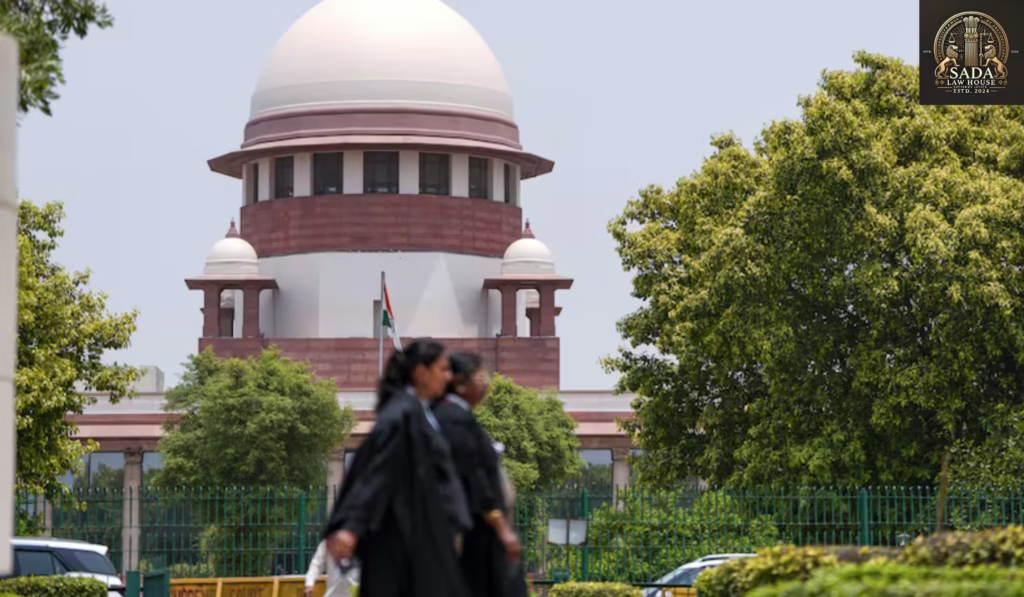Supreme Court to Hear Plea Next Week on Jamia Nagar Demolitions in Delhi
Trending Today Supreme Court to Hear Plea Next Week on Jamia Nagar Demolitions in Delhi Supreme Court Upholds Arrest Stay of BJP Minister Vijay Shah in Colonel Sofiya Qureshi Case, Ends MP High Court Proceedings Kerala High Court Grants Anticipatory Bail to Filmmaker Akhil Marar Over Alleged Seditious Remarks Supreme Court: No Blanket Ban on Witness Statement Disclosure Without Individual Threat Assessment Under UAPA WazirX Hack Explained: Legal Analysis and Cryptocurrency Security Lessons from India’s Biggest Crypto Breach LEGAL JOB OPPORTUNITY AT JURIDICA SOLUTIO LLP, DELHI JOB OPPORTUNITY AT JUNIOR ADVOCATE AT SAHALNA ASSOCIATE JOB OPPORTUNITY AT EVARA LEGAL LLP JOB OPPORTUNITY AT CHAMBERS OF ADITYA BHARAT MANUBARWALA JOB OPPORTUNITY AT CHAMBERS OF MS. SUPRIYA JUNEJA AND MR. ADITYA SINGLA Supreme Court to Hear Plea Next Week on Jamia Nagar Demolitions in Delhi PRABAHAT KUMAR BILTORIA 31 May 2025 The Supreme Court of India will hear a plea next week challenging demolition orders in Jamia Nagar, Delhi. The petition questions the legality of notices issued without due process, raising concerns about arbitrary evictions. Background: Supreme Court Agrees to Review Demolition Plea On Thursday, May 29, the Supreme Court of India agreed to hear a petition next week regarding demolition notices issued in Jamia Nagar, Delhi. The notices pertain to alleged unauthorized constructions in the area. The plea was presented before Chief Justice of India BR Gavai, who initially advised the counsel to approach the High Court. However, the counsel argued that the notices were issued in violation of previous Supreme Court directives and insisted that the matter needed urgent attention. Allegations of Arbitrary Demolition The petitioners claim that structures were “arbitrarily picked” for demolition, and that they were not part of the area mentioned in the court’s earlier contempt ruling. The counsel asserted that this was originally a private dispute which escalated to a court-ordered demolition without a fair hearing. They stated that although the Supreme Court allowed a 15-day notice period, residents received notices affixed outside their homes on May 26, demanding immediate eviction without due process. Legal Concerns Over Due Process The counsel emphasized that since the Supreme Court’s previous order affected the parties directly, the High Court could not be approached. They requested a recall of the order on the grounds that the affected individuals were not heard during the original proceedings. In response, CJI Gavai remarked that the demolition was being executed based on a valid Supreme Court directive after a thorough document review. “We cannot sit in appeal over this Court’s directions,” he stated, though he maintained that the High Court remained an available forum. Listing Confirmed for Next Week Despite repeated suggestions to take the matter to the High Court, the counsel pressed for an urgent hearing in the Supreme Court. Eventually, the CJI agreed to list the matter for the upcoming week. Earlier on May 8, the Supreme Court had instructed the Delhi Development Authority and the Delhi government to proceed with the legal demolition of unauthorized constructions over more than four bighas of public land in Khasra No. 279, Okhla Village, within a period of three months. Conclusion: A Critical Legal Test for Property Rights and Due Process The upcoming hearing in the Supreme Court of India will be pivotal in determining whether demolition actions in Jamia Nagar were carried out in compliance with legal procedures and constitutional rights. With allegations of arbitrary notices and lack of proper hearing, the case raises important questions about the balance between urban development and the protection of individual rights. As Delhi continues to grapple with unauthorized constructions, the outcome of this plea could set a crucial precedent for similar disputes across the country. Leave a Reply Cancel Reply Logged in as Sada Law. Edit your profile. Log out? Required fields are marked * Message* Live Cases Supreme Court to Hear Plea Next Week on Jamia Nagar Demolitions in Delhi Supreme Court to Hear Plea Next Week on Jamia Nagar Demolitions in Delhi Sada Law • May 30, 2025 • Live cases • No Comments Supreme Court Upholds Arrest Stay of BJP Minister Vijay Shah in Colonel Sofiya Qureshi Case, Ends MP High Court Proceedings Supreme Court Upholds Arrest Stay of BJP Minister Vijay Shah in Colonel Sofiya Qureshi Case, Ends MP High Court Proceedings Sada Law • May 30, 2025 • Live cases • No Comments Kerala High Court Grants Anticipatory Bail to Filmmaker Akhil Marar Over Alleged Seditious Remarks Kerala High Court Grants Anticipatory Bail to Filmmaker Akhil Marar Over Alleged Seditious Remarks Sada Law • May 30, 2025 • Live cases • No Comments 1 2 3 … 5 Next »
Supreme Court to Hear Plea Next Week on Jamia Nagar Demolitions in Delhi Read More »





